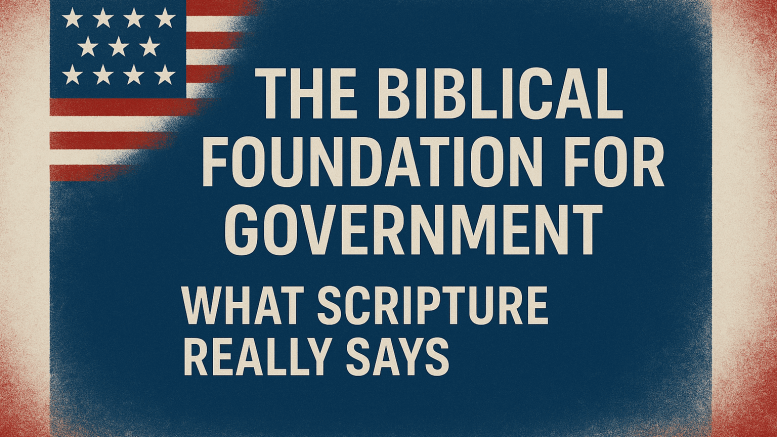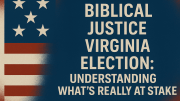Dear Christian:
Before you cast a single vote on November 4th, you need to understand the biblical view of government Virginia candidates hold. What does God’s Word actually say about government? The candidates running for Virginia governor hold radically different views about government’s purpose, scope, and authority. One vision aligns with Scripture and our Constitution. The other leads to tyranny disguised as compassion.
The reality is that most Christians have never been taught the biblical view of government. We’ve inherited assumptions from the culture—some biblical, some not. And that confusion makes us vulnerable to policies that sound caring but violate God’s design.
Let’s fix that today.
The Biblical View of Government: Limited Authority Under God
Here’s the foundation: God instituted government, and He gave it a specific, limited role.
The Apostle Peter wrote to Christians living under Roman persecution:
“Be subject for the Lord’s sake to every human institution, whether it be to the emperor as supreme, or to governors as sent by him to punish those who do evil and to praise those who do good.” (1 Peter 2:13-14)
Notice what Peter says the government exists to do: Punish evil. Reward good.
That’s it. The government’s biblical mandate is justice—protecting the innocent and punishing the guilty. Consequently, it’s the mechanism God ordained to restrain evil in a fallen world so that His people can “lead a peaceful and quiet life, godly and dignified in every way” (1 Timothy 2:2).
Government isn’t called to be your provider, your parent, your employer, or your savior. Rather, it’s called to maintain order and administer justice according to God’s moral law.
When the government stays within these boundaries, society flourishes. However, when it exceeds them, tyranny grows.
Christians Must Submit—Until Government Commands Sin
Paul echoes this in Romans 13:
“Let every person be subject to the governing authorities. For there is no authority except from God, and those that exist have been instituted by God.” (Romans 13:1)
This is crucial: All legitimate governmental authority comes from God. Rulers don’t derive their power from the consent of the governed, or from military might, or from election results. Instead, they derive it from God, who delegates authority to them for His purposes.
This means Christians are to be the most law-abiding citizens in any society. We obey speed limits. We pay taxes. We respect authority—not because human government is ultimate, but because God is, and He commands our submission to the structures He’s established.
But—and this is critical—our highest allegiance is always to God, not government.
When the Sanhedrin commanded Peter and John to stop preaching Christ, here’s how they responded:
“Whether it is right in the sight of God to listen to you rather than to God, you must judge, for we cannot but speak of what we have seen and heard.” (Acts 4:19-20)
Notice the balance: Respectful tone. Clear conscience. Firm refusal.
Therefore, when the government commands what God forbids or forbids what God commands, the Christian’s duty is to engage in civil disobedience. Not rebellion—we don’t take up arms against authorities. However, we obey God rather than men, and we accept the earthly consequences while trusting God’s ultimate justice.
This is why Virginia’s elections matter so much. If we elect leaders who will punish good and reward evil—who will penalize Christians for living according to Scripture while celebrating what God calls sin—we face a collision between our allegiance to God and our submission to government.
Who Should Lead According to Biblical Government Principles?
When Moses was overwhelmed trying to govern Israel alone, his father-in-law Jethro gave him wise counsel:
“Moreover, look for able men from all the people, men who fear God, who are trustworthy and hate a bribe, and place such men over the people as chiefs of thousands, of hundreds, of fifties, and of tens.” (Exodus 18:21)
These are God’s qualifications for leaders:
1. Able (competent) – Leadership requires skill, not just good intentions.
2. Fear God – They must recognize an authority higher than themselves and govern according to God’s moral law.
3. Trustworthy – Their word must mean something. Character matters more than charisma.
4. Hate a bribe – They must be incorruptible, not swayed by money, power, or popularity.
Now ask yourself: Do the candidates in Virginia’s gubernatorial race meet these biblical qualifications? Furthermore, have you even thought to measure them by this standard?
Most Christians vote based on personality, party loyalty, or single issues. However, God gives us a framework for evaluating leaders. We should use it.
The Marxist Alternative: Government as God
Here’s where we need to understand what we’re voting against.
Karl Marx and Vladimir Lenin articulated a vision of government that directly contradicts Scripture. They believed that human problems stem from unjust systems, not sinful hearts. Consequently, their solution? A powerful, centralized State that controls every aspect of society.
Marx’s Communist Manifesto advocates for:
- Abolition of private property
- Heavy progressive income taxes
- Centralized control of education
- State ownership of factories and production
- Abolition of inheritance rights
Lenin added: “Our task is to make the State even bigger, even more democratic, even more comprehensive… The State Bank, the biggest of the big… will constitute as much as nine-tenths of the socialist apparatus.”
Notice the pattern? Under Marxism, the State replaces God as the source of provision, justice, truth, and salvation.
This is why Marx declared that “the first requisite for the happiness of the people is the abolition of religion.” He understood that you cannot worship God and the State. One must bow to the other.
Christians, this isn’t ancient history or distant theory. This ideology is alive and thriving in American politics today. When candidates promise that government will provide your healthcare, control your income, educate your children, and solve systemic injustices through top-down mandates—that’s Marxism with a compassionate mask.
And it always, always leads to tyranny.
How the Biblical View of Government Applies to Virginia Elections
So what does this mean for November 4th?
You’re not just choosing between two personalities. You’re choosing between two fundamentally different visions of government. Understanding the biblical view of government Virginia candidates hold is essential to voting with conviction:
Biblical Vision:
- Limited government focused on justice
- Individual liberty and responsibility
- Private property rights
- Free markets and voluntary exchange
- Government as servant, not master
- Recognition that only God can change hearts
Statist Vision:
- Expansive government solves all social problems
- Collective rights superseding individual liberty
- Redistribution of wealth to achieve “equity”
- Centralized control of education, healthcare, economy
- Government as provider and savior
- Belief that systems—not sin—are the root problem
Virginia’s candidates have clear records showing which vision they embrace. Some believe the government should protect your freedom to work, worship, and raise your family according to your convictions. In contrast, others believe the government should compel you to affirm their ideology and redistribute your resources for their vision of “justice.”
One approach leads to liberty under God. The other leads to bondage under the State.
Scripture warns us: “Righteousness exalts a nation, but sin is a reproach to any people” (Proverbs 14:34). Therefore, when we elect leaders who reject God’s moral law and expand government beyond its biblical mandate, we get exactly what we deserve—and our children pay the price.
Your Action Step Today
Here’s what I want you to do:
Visit the Virginia Christian Voter Guide and look specifically at where the gubernatorial candidates stand on these issues related to the biblical view of government:
- Religious liberty protections
- Parental rights in education
- Size and scope of state government
- Property rights and economic freedom
- Constitutional fidelity
Then ask yourself: Which candidate’s vision aligns with the biblical view of government, Virginia Christians should support—limited government ordained by God to punish evil and reward good?
Don’t vote based on personality or party. Instead, vote based on biblical principles.
Tomorrow, we’ll tackle religious liberty—and you’ll see exactly what’s at stake when government exceeds its God-given boundaries.
“When the righteous increase, the people rejoice, but when the wicked rule, the people groan.” (Proverbs 29:2)
Virginia is deciding which future we want. Therefore, choose wisely.
Get Your Personalized Voter Information: Virginia Christian Voter Guide
We welcome thoughtful and respectful dialogue from all viewpoints. Comments must remain civil, relevant, and free of profanity, personal attacks, or mockery of Christian faith. Disagreement is allowed—disrespect is not.






God will not hold us blameless! All Americans, but especially Christian Americans are duty-bound to petition (Interpose) for redress of grievences, as is our 1st Amendment Right, when our elected officials violate their oath to the Constitution in the passing of immoral laws that violate God’s law.
Sadly we’re faced with another of what feels like a lesser of 2 evils choice. The constitution guarantees limited government yet it’s not mentioned with any force by the alleged conservative. Is the likely blowout due to Youngkin, Trump, Sears or an electorate that has Che Guvera posters on the hood of their Teslas?